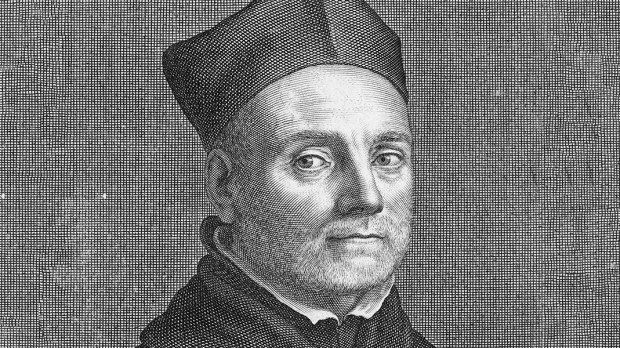In the modern era, knowledge has become so specialized that even a brilliant person can spend decades on the quest to gain expertise in one particular subject. Centuries ago, however, far less was known about math, medicine, chemistry, and basically any other field of study. So it was possible for one extraordinary intellect to become acquainted with the bulk of existing scholarly information: Athanasius Kircher, a Jesuit of colossal erudition, could “rightfully claim all knowledge as his domain.”
The son of a theology professor, he was born in central Germany on May 2, 1601 (some sources say 1602). Ironically, Kircher, who would proceed to accumulate so much knowledge, was himself never entirely sure if he had been born in 1601 or 1602.
He began Jesuit schooling at about age 10, and Jesuit ideals “soon became his own,” both in terms of scholarship and faith. In fact, over the course of his eight decades, Kircher does not once seem to have questioned Catholic doctrine.
He entered the Jesuit order as a novice in his mid-teens. In his early adulthood, he taught math and ancient languages at Jesuit schools. Upon being ordained a priest in 1628, he joined the faculty at the University of Würzburg, where he again taught math and ancient languages, along with ethics.
Kircher had wanted to head to China as a missionary, but he could not receive approval from his superiors for this endeavor. Further complicating things was the tumult of the Thirty Years’ War, which compelled him to seek refuge in the French cities of Avignon and Lyons.
In 1634, he relocated to Rome, where he would spend most of his remaining years. He lectured on math, physics, and Oriental languages in the Roman College (now the Pontifical Gregorian University) for six years, before being granted a release from teaching duties so that he could devote more time to his independent studies. With his reputation as a polymath established, he was receiving patronage from both sacred and secular sources.
Now in an ideal position to pursue his research, Kircher proceeded to make contributions to such varied fields as musicology, biblical studies, geology, Orientalism, and bacteriology, among others. Also a practitioner of the discipline now known as linguistics, he researched the relationship between such languages as Arabic, French, Greek, Hebrew, Latin, Persian, and Portuguese. He even undertook to create a universal language.
He was also involved with technological innovation. Indeed, some inventions have been incorrectly attributed to him. Of course, the very fact that he received credit suggests his former relevance in such undertakings.
Active as an experimenter, he used a microscope to analyze the blood of plague victims and formed some rather insightful, if not entirely accurate, ideas about the causes of plague. In a separate experiment, he tested the possibility of using firefly extract to light houses.
Kircher could take his curiosity to extreme lengths. For example, not long after a 1631 Mt. Vesuvius eruption, he climbed the notorious volcano and, with his body tied to a rope, he descended into the crater. He then used a pantometer to accurately measure the volcano’s inner dimensions. Towards the end of his life, the results of his geologic investigations saw publication in a two-volume work called Mundus Subterraneus.

Read more:
The story of the Irishman who invented the submarine
In all, he authored 44 books (all of them apparently written in Latin), many of which were viewed as required reading by the leading minds of his era. Though he was an omniscient scholar, Kircher was indeed a mortal – one who made some major mistakes with his attempt at deciphering Egyptian hieroglyphics. And he sometimes erred with other subjects as well.
That said, he was “the first scholar with a global reputation,” according to biographer Paula Findlen.
Kircher died in Rome on November 27, 1680, at age 79. As prominent as he was during his lifetime, his name became obscure in the years after his death. Recent decades, however, have seen him receive renewed attention, as shown by the 2004 release of a 464-page book titled Athanasius Kircher: The Last Man Who Knew Everything.
Centuries before the internet, this Jesuit was the world’s leading repository of information. But these days, with the countless terabytes of information accessible from a search engine, one would need numerous lifetimes just to view all that material, let alone absorb it. One well might assume that the future will not beget another Athanasius Kircher.

Read more:
A thousand scientists tackle the “science is opposed to faith” myth

